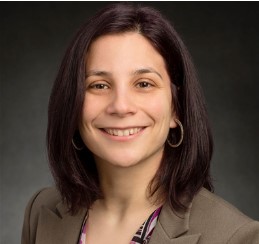
- This event has passed.
Colloquium Series: Mechanisms of materials: computation-guided prediction and design of functional properties in complex configuration spaces (Dr. Elif Ertekin, University of Illinois)
Tuesday, January 25, 2022 @ 4:00 pm - 5:00 pm

 Join us on Zoom for our Colloquium Series. Dr. Elif Ertekin from the University of Illinois will be joining us to present, “Mechanisms of materials: computation-guided prediction and design of functional properties in complex configuration spaces.”
Join us on Zoom for our Colloquium Series. Dr. Elif Ertekin from the University of Illinois will be joining us to present, “Mechanisms of materials: computation-guided prediction and design of functional properties in complex configuration spaces.”
Biography: Elif Ertekin is Associate Professor and Director of Mechanics Programs at the Mechanical Science and Engineering Department at the University of Illinois at Urbana-Champaign. She is a faculty affiliate of the National Center for Supercomputing Applications (NCSA) and the Materials Research Laboratory (MRL) at the University of Illinois. Her research interests are centered on the theory and modeling of materials using a variety of computational methods. She focuses on developing a microscopic understanding of atomic and electronic scale processes, with applications areas in thermal transport, energy conversion, and defect chemistry. She received her PhD in Materials Science and Engineering from UC Berkeley and carried out post-doctoral work at the Berkeley Nanoscience and Nanoengineering Institute and the Massachusetts Institute of Technology before moving to Illinois. She has received the NSF CAREER Award, the TMS Early Career Faculty Fellow Award, the Emerging Leader Award from the Society of Women Engineers, and the Dean’s Award for Excellence in Research and the Rose Award for Teaching Excellence at Illinois. She currently serves as the Director of the Network for Computational Nanotechnology Nanomanufacturing Node and is an Associate Editor for the Journal of Applied Physics.
Abstract: From quantum mechanics, we know that the functional properties of a material are governed by the material’s atomic scale structure. Quantum mechanical simulation, as carried out in the field of computational materials science, has vastly improved our ability to discover new materials, determine their behavior and mechanisms, explore theories, and explain puzzling experimental observations. Yet, the discovery of new materials using computation-guided experiments remains a long-standing challenge that arises from the vast compositional and structural phase space in which materials live. In this presentation, I will highlight our group’s recent work which aims to extend solid-state and semiconductor theory to develop computational approaches applicable to and design rules for materials that live in complex configuration spaces – multicomponent alloys, disordered systems, and hybrid materials. The application areas include thermoelectrics, ion conductors, and ultra-low thermal conductivity materials and we will focus on prediction of properties such as vibrational transport, ion transport, and electronic structure defect chemistry. The principal focus is on development of methods to predict functional properties in complex materials landscapes, validate results with experiment, and use the resulting insights to predict new materials and compositions by design.

